A Conversation with Michael Lamb | A Commonwealth of Hope: Augustine's Political Thought (Princeton, 2022)
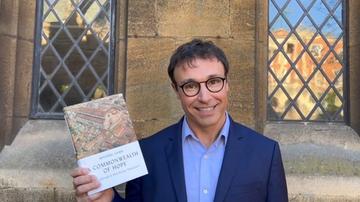
A conversation with Michael Lamb on his new book, A Commonwealth of Hope: Augustine’s Political Thought (Princeton, 2022). Lamb is the Assistant Professor of Politics, Ethics, and Interdisciplinary Humanities and the Executive Director of the Program for Leadership and Character at Wake Forest University. He is also a Research Fellow at the Oxford Character Project. Michael’s research focuses on the ethics of citizenship and the role of virtues in public life. His latest work on St Augustine offers a novel interpretation of Augustine’s political thought and recovers his virtue of hope to inform contemporary politics.
By Matt Andersen, DPhil candidate in History at the University of Oxford and Editor of the Oxford Centre for Intellectual History blog.
Matt Andersen: You spent a good amount of time at Oxford as both a graduate student and a postdoctoral research fellow. Could you start off by telling us a little bit more about your time here and how Oxford contributed to your intellectual development?
Michael Lamb: I arrived in Oxford in 2004 after completing an undergraduate degree in political science in the US. I came to study for a second BA in philosophy and theology, which gave me a chance to think about the sources and traditions that shape much of our ethical thinking. I was interested in the ways in which philosophical and religious ethics might be related to each other and how they might help us understand different traditions of thinking about how to live. So, I took courses in the history of philosophy, ethics, and political theory as well as in religion and theology.
Then I went to graduate school at Princeton and grappled with how these different fields might inform social and political life. I did an interdisciplinary program in political philosophy that included courses in political theory, philosophy, and religion. As I became interested in the virtue of hope and its relevance for politics, I discovered that many of the strongest critics of democratic hope claimed the authority of Augustine. Yet, as I read more of Augustine, especially more theological texts not frequently read by political theorists, I realized that he offered a more nuanced account of hope than accounts of his “pessimism” allow. So I wrote my dissertation on Augustine’s virtue of hope to challenge influential interpretations of his pessimism. Then I returned to Oxford to do a postdoctoral fellowship with the Oxford Character Project, where I worked with colleagues to translate theory and research on virtue into practical programming and curricula to help students become leaders of character.
MA: Some of our readers may not be as acquainted with the life and thought of St Augustine. Who was he? Why are so many political thinkers still talking about the ideas of a 5th century early Christian theologian from Northern Africa?
ML: Augustine of Hippo was a Christian bishop and theologian from North Africa who lived in the Roman empire and died in 430 while his city was under siege by the Vandals. He was a famous professor of rhetoric before he became an influential preacher and bishop. In addition to starting a monastery, serving his congregation, and helping to lead the Catholic Church, he remained a prolific writer. His work went on to have a significant influence across a wide range of thinkers in the history of Western thought—both Catholic and Protestant, religious and secular. These thinkers include Thomas Aquinas, Dante Alighieri, and Christine de Pizan in the medieval period; Martin Luther, John Milton, and Jean-Jacques Rousseau in the modern period; and John Rawls, Hannah Arendt, and Judith Shklar, among others, in contemporary political theory. Many political officials and public intellectuals also cite Augustine’s authority to justify competing stances on various public policies, from abortion to just war. President Joe Biden quoted Augustine in his inaugural address, and Bob Dylan and Sting have even written songs about him. So his influence in contemporary politics and culture is pervasive.
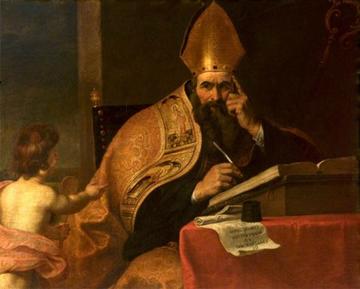
Augustine of Hippo.
MA: Given how many theologians, political theorists and intellectual historians have all grappled with Augustine’s work, I was wondering about how you managed to critically assess and synthesise the conflicting interpretations and literature from all these different disciplines in your book, A Commonwealth of Hope: Augustine's Political Thought?
ML: The questions that Augustine address are not reducible to any one discipline. As a scholar of interdisciplinary humanities, I've always been curious about what we can learn from philosophy, history, literature, and politics. In this book, I wanted to understand what these different fields might teach us about ourselves and about Augustine, whose work was composed before the rise of academic specialization. He was writing at a time when philosophy, theology, political theory, and history were all part of one intellectual enterprise. So, to understand his work holistically within this context, we have to avoid the intellectual silos and disciplinary boundaries that might confine our understanding.
Of course, doing interdisciplinary work well is really hard because engaging in a new discipline is like learning a new language, and learning a new language requires intensive study and extensive practice. It’s easy to wave our hands at different disciplines and say that we're being interdisciplinary, but it takes a lot of effort and attention to do it well and to understand the particular methods and materials that shape each field and how they might influence our perspectives on a given thinker or text. I’ve learned so much about Augustine (and about being a scholar) from other scholars across multiple fields.
MA: How would you describe the state of play of Augustine scholarship before you wrote this book? People have been writing about Augustine for centuries. Did you feel there were some gaps in the knowledge of political theorists dealing with Augustine’s corpus?
ML: As a political theorist, I was very aware of an Augustine who was seen as a pessimist about the world and therefore about politics. This view was held by important modern political thinkers who've engaged Augustine's work in ways that either dismiss his thought or parlay his pessimism to serve their own purposes. But as I began to read more of Augustine's work, especially sermons, treatises, and letters that often aren't read by political theorists (who tend to focus on The City of God), I began to see a much more nuanced and robust vision of hope as a virtue that avoids the modern binary between optimism and pessimism that is often foisted upon Augustine. I wanted to bring some of those more theological texts into political theory and show how understanding his account of hope as a virtue might challenge and expand our interpretations of his political thinking. To do that, I relied not only on neglected primary texts but also on secondary scholarship in theology and religious studies that elevated the importance of his sermons and letters for understanding his moral and political thought.
Another important influence on my own thinking was the recent turn in philosophy, classics, and political theory toward analyzing rhetoric in order to situate texts within their historical contexts. Pierre Hadot talks about philosophy as a “way of life” and shows how ancient philosophers use rhetoric to not only shape the ideas of their audiences but to also shape their character, to change how they think, feel, and act. This approach helped me see how Augustine was drawing on his education and training as a rhetorician to engage his audiences.
MA: You talk a lot about the ‘rhetorical’ context of Augustine’s work in both his sermons and treatises. How can an intellectual historian (or historically informed theologian) take this into consideration practically? Isn’t this moving our exegesis into the realm of literary criticism? How can we be sure we’re interpreting his ideas correctly?
ML: Augustine lived in a deeply rhetorical culture. He studied rhetoric, taught rhetoric, and defended the role of rhetoric in his work. In On Christian Teaching, he offers a detailed account of “signs,” interpretation, and rhetoric that had a significant influence on the later study of both literature and rhetoric. So, Augustine’s context and work are deeply literary and rhetorical, which is why it’s not anachronistic or inappropriate to consider how Augustine’s rhetoric might shape our interpretations of his thought. In fact, not recognizing rhetoric’s influence would potentially lead to distorted and decontextualized interpretations.
This is one reason why many political theorists interpret Augustine as a “pessimist”: they miss how he is using rhetoric both to “instruct” his audiences about particular ideas and “encourage” them in ways that might change who they are and who they aspire to be. As I read more of Augustine’s work, learned about his rhetorical context, and engaged secondary scholarship in philosophy, theology, and classics, I began to see how rhetoric shapes Augustine's writing about politics and why we can't separate the former professor’s rhetorical and pedagogical purposes from his moral and political aims.
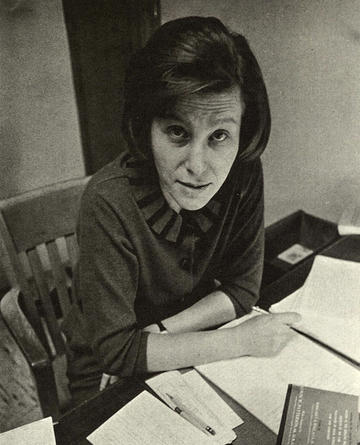
Judith Shklar pictured in the 1966 Harvard Yearbook (Harvard Yearbook Publications).
MA: I want to turn to some of the ideas you talk about in the first chapter of your book. You talk about mid-century intellectuals like Judith Shklar and Reinhold Niebuhr to whom you apportion some of the blame for an overly pessimistic misreading of Augustine. You argue that they focus on Augustine’s conception of sin at the expense of other virtues that are also inherent in the human condition. You’ve devoted the whole book to talking about how they seem to all be clustered around the 20th century. Could you talk a little bit more about the 20th century context of this political pessimism and why they felt the need to draft Augustine as this prophet of modernity?
ML: The 20th-century context is very important for understanding why Augustine was presented as a pessimist. Thinkers such as Hannah Arendt and Judith Shklar both engaged with Augustine in the wake of the Holocaust, a world war, and totalitarianism. In such a context, Augustine seemed acutely attuned to how the modern world is fraught with evil and domination. The horrors of the 20th century informed which parts of Augustine many thinkers found compelling, and his critical view of human nature gave them resources to chasten utopian presumptions and recognize the realities of politics in ways that were alert to the dangers that the 20th century brought.
In the book, I talk about how the context of these interpreters made them more inclined to focus on certain passages that spoke to their time. They especially emphasized selections that focus on social and political evils rather than those that are more aspirational and hopeful, which helps to explain why they found Augustine relevant for explaining contemporary forms of injustice and domination.
MA: With regards to modern interpretations of Augustine, I have also been thinking about Jean Bethke Elsthain’s of version of Augustine and the kind of neo-conservative appropriation of Augustine that we saw in the early 21st century. It was an Augustine used to justify an interventionist foreign policy. I feel it is a shame that Augustine has been read in such a way. Do you have any thoughts on this?
ML: The way in which Augustine has been read as a proponent of certain forms of violence is really problematic. He is certainly part of the just war tradition, but he did not see the just war tradition as a checklist to be filled out to justify going to war. Rather, he saw it as a constraint on when war might be appropriate to defend innocent lives in a historical context where many Roman political and military leaders did not hesitate to use violence indiscriminately. Instead of licensing the lust for violence and domination, Augustine’s reflections on a just war were attempts to resist and restrain it. He remains one of the great critics of empire, domination, and violence for selfish or nationalistic purposes.
I think the debate around Augustine's view of torture is an interesting case study of how he is often misread and why taking his thought out of context can be problematic when justifying contemporary policy positions. Interpreters often take his account of the “wise judge” in City of God, 19.6, as evidence that he believes torture is sometimes necessary. But as Veronica Roberts Ogle has shown, the context of the passage—situated within Augustine’s critique of Stoicism—shows that he is actually criticizing the Stoic view of the “wise judge”—one of their paradigms of virtue—as indifferent to suffering and lacking in compassion and humanity. This critique is clear if you look at Augustine's other texts, especially his letters to Roman officials, where he explicitly condemns torture. So, the invocation of Augustine of justify torture shows how a narrow and selective reading of one prominent passage and the neglect of more occasional texts like his sermons and letters can distort our understanding of Augustine's thought and fuel contemporary appropriations that misrepresent what Augustine believed.
MA: Absolutely. It’s as we've talked about many times before with the case of a prominent Niebuhr scholarship, too. A lot of Niebuhr’s lesser-known theological texts have been ignored, and often standard interpretations of his work only focus on his popular books. Just like with Niebuhr scholarship, I think Augustine’s letters and sermons in particular are some of his most important texts for understanding his thought. But often when we do this type of close reading and contextualist work, we find instabilities and tensons in an author’s thought that defies codification, and that can be unsettling. It’s more comforting (and intellectually easier) to assume that a thinker has a fixed, stable, and systematic set of ideas that can be reduced to a few neat ‘-isms’. Is that tendency to assume too systematic and stable and rationalistic a thought process of said thinker a cause of some of these misinterpretations of Augustine in the 20th century?
ML: Yes, I think so. The influence of Enlightenment assumptions about philosophy and rhetoric—namely, that philosophy is systematic and that rhetoric is problematic because it engages the emotions more than reason—can cause some contemporary philosophers to read Augustine’s texts analytically and miss how he is using rhetoric pedagogically to shape his audiences.
Many of Augustine’s texts are also not as well known or accessible, which makes it hard to know how to understand their relevance to the whole of his thought. Augustine wrote a lot—over a hundred books, hundreds of letters, and thousands of sermons. When you add it all up, it's hard for anyone, especially those who aren’t specialists, to read all of it just to understand Augustine's thought. So, I think there's a good reason why political theorists focus on one text, especially book 19 of The City of God, which is about the right length for introductory political theory courses. But there is a danger of distortion if we let this one book become the proof text for understanding the whole of Augustine’s political thought.
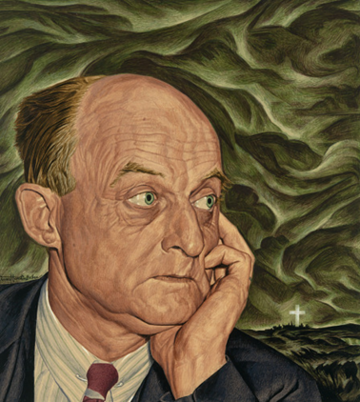
Portrait of Reinhold Niebuhr in 1948 by Ernest Hamlin Baker in the National Portrait Gallery.
MA: I want to turn to the concept of political theology, and by that, I mean the appropriation of conceptual equipment from the Bible and Christian tradition at large to deal with what we can call the worldly questions of politics. When many people hear the term, they immediately think of Carl Schmitt and his book, The Concept of the Political, where he claims that every modern political concept is a theological concept secularized. What I think your book is really doing, and correct me if I'm wrong, is pushing this boundary back and saying that actually political theology is a fundamental part of our Western intellectual tradition. There was never this sort of need separation between the theological and the political. And if there was, that was something that was introduced much later on, maybe in the 18th or 19th centuries. Could you see this book as part of this broader intervention in kind of reclaiming political theology back from its Schmittian heritage?
ML: Absolutely. In fact, I contributed a chapter to the T&T Clark Handbook of Political Theology that includes a chapter on how Augustine engages questions of theology and politics in his own time, prior to contemporary debates about the origins of political theology.
I think Augustine is relevant for a couple of reasons. First, he articulates a theology that does inform his politics. His view of politics is not neutral. It is informed by his own theological assumptions about love, sin, power, and virtue. But he also seeks to make those ideas relevant to a wider audience, including those who might not agree with his theological position. He is doing work that's informed by his theological tradition while also envisioning a political commonwealth that can include diverse citizens from many different traditions in one political community.
In addition to taking theological concepts into politics, he also takes political concepts into his theology. It's no accident that he uses the phrases, “city of God” and “heavenly commonwealth.” The “city” (civitas) was a very prominent Roman political construct, as was “commonwealth” (res publica), which was central to Cicero’s thought. Augustine is engaging and, at times, appropriating Roman political concepts to engage his Roman audiences and show how they might illuminate and expand views of what theology and politics can be. So, he’s doing political theology long before Carl Schmitt.
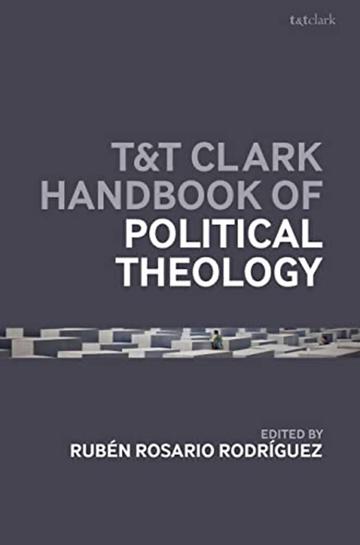
T&T Clark Handbook of Political Theology (2019).
MA: If the average person could tell us one thing about Augustine’s work, they would probably say that he concerned about the relationship between faith and politics. If the debate could be explained via a spectrum with, on the one hand, let’s call it the JFK or the liberal line, the argument that religion and politics are entirely separate enterprises, and those in politics should govern not by the private interests of faith, but the public interests of the state; and on the other hand, the maximalist line of Mike Pence, for instance, where one’s religion should permeate every aspect of policymaking and political thought, since the ‘Bible contains all the answers’. Surely there is a more nuanced middle way. Does Augustine offer us any clues to navigate ourselves out of this unhelpful dichotomy?
ML: I think he does offer a middle way between these two positions. Augustine does believe that our personal values and commitments should shape how we think about our lives within our communities, including our political communities. He does not advocate a strict neutrality. But he also recognizes that human beings, including both Christians and non-Christians, are parts of political communities with diverse citizens who order their loves in different ways toward different ultimate ends. He thinks that we can and should share certain common goods such as peace or justice across these divisions. Sustaining the commonwealth requires finding convergence around “common objects” of love and hope among people with different ultimate backgrounds and beliefs. This approach recognizes the value of including citizens from different backgrounds and traditions without requiring them to bracket their personal values, beliefs, and commitments from their political lives. This approach to pluralism can offer some helpful resources for our own time, I think.
In addition to avoiding the two extremes you mention, his thought can also address a third group––those who claim that Christians cannot be involved in politics at all because they should avoid being corrupted by a political system that is inherently sinful and destructive. You see this, for example, in Rod Dreher’s “Benedict Option,” or in other theologians such as John Millbank, who encourages a resistance to certain forms of secular politics. Augustine, both in his writings and in his own life as a citizen and bishop, shows the importance of engaging in public life and not retreating into enclaves that ignore the responsibility to care for those in our communities. Augustine avoids the despair that encourages retreat and instead embodies an active hope that orients us toward serving our communities.


